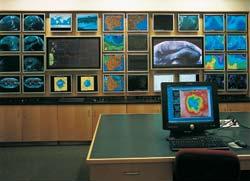Plymouth State University’s programs in initial teacher preparation, advanced educator and professional school personnel have received reaccreditation approval from the National Council for the Accreditation of Teacher Education (NCATE) through spring 2010. Plymouth State is the first New Hampshire school to be accredited under the exacting new standards mandated by NCATE in 2000.
“This year NCATE is celebrating its 50th anniversary as the premier national accrediting body for teacher education,” says PSU President Donald P. Wharton, “and we are proud to say that Plymouth State programs have been accredited for the entire 50 years.”
Patricia Cantor, chair of the University’s Council of Teacher Education, says, “The NCATE visiting team was struck by how well our candidates and faculty exemplify the qualities described in our conceptual framework for teacher education: commitment, holism, experience, collaboration and knowledge. They were particularly impressed by the commitment and enthusiasm of our candidates, the knowledge and dedication of the faculty and the many exciting collaborative ventures with which Plymouth State is involved in the wider professional education community throughout the state and region.”
NCATE-accredited schools must meet rigorous standards. Teacher candidates must have in-depth knowledge of their chosen subject matter as well as skills to convey that knowledge successfully to students. The university must assess this knowledge and skill carefully to determine whether students may be certified to teach. The institution must also have partnerships with schools from preschool through grade 12 to enable candidates to develop the skills necessary to help students learn. Candidates must be prepared to understand and work with diverse student populations, and university faculty must model effective teaching practices. The university must also demonstrate the availability of a variety of resources, including information technology.
Provost Virginia Barry says, “The accreditation experience engages the entire campus in an assessment process that is focused on evaluating our curriculum, student outcomes and quality experiences that best prepare candidates to meet the demands of the teaching profession. Students graduating from an NCATE-accredited school are recognized by certifying agencies throughout the United States.”
NCATE revises its standards every five years to incorporate best practices and research to ensure that they reflect the current consensus about what is important in teacher preparation. In the past decade, NCATE has moved from a focus on the curriculum offered to candidates, to a data-driven, performance-based system dedicated to determining what candidates know and are able to do.
NCATE accreditation covers both Plymouth State’s undergraduate and graduate programs. “We are very proud to have our graduate teacher education programs recognized by NCATE as meeting these high standards,” says Dennise Maslakowski, associate vice president for graduate studies and community outreach. “We have excellent graduate faculty and adjunct faculty (many of whom are teachers and administrators at schools across the state) who work very hard in bridging theory to practice in our courses, and I appreciate all their assistance in helping PSU achieve this accreditation.”
Cantor adds, “NCATE accreditation is widely recognized as a mark of distinction and that is one of the reasons so many teacher candidates choose to study at Plymouth State University. Graduating from an NCATE-approved program makes our students more attractive candidates for education positions all over the United States. They are well poised to become the new leaders in their field.”
NCATE is a nonprofit, nongovernmental alliance of 33 national professional education and public organizations. NCATE currently accredits 575 institutions, which produce two-thirds of the nation’s new teacher graduates each year. The U.S. Department of Education and the Council for Higher Education Accreditation recognize NCATE as an accrediting body for schools, colleges and the department of education.
-EC









